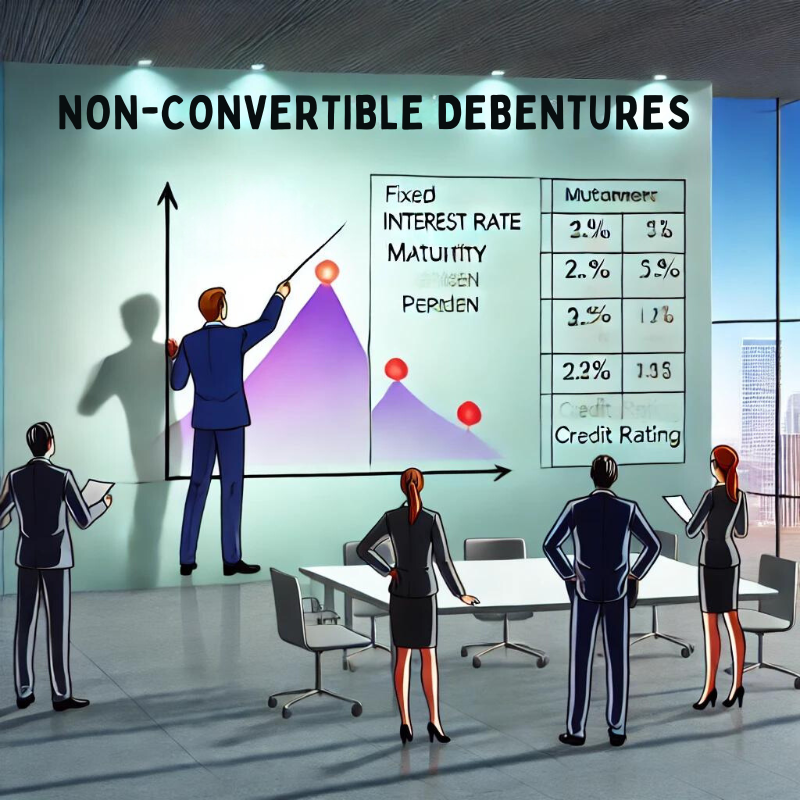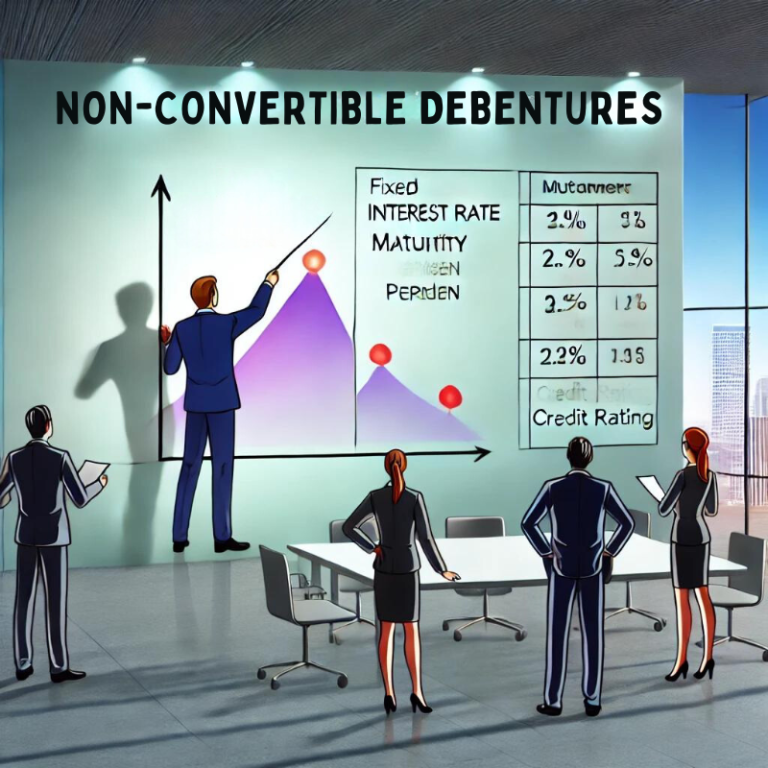Non-Convertible Debentures, commonly referred to as NCDs, are fixed-income investment instruments issued by companies that garner long-term funds. Unlike convertible debentures, an NCD is not convertible into equity shares of the issuing company. The investors in NCDs will receive a fixed interest rate over a fixed period. The main reason for availing of NCD is the stability in income and no dilution of ownership; they are suitable for risk-averse investors. This paper is going to discuss some of the key features, risks involved, types, and buying methods of NCDs. Comparison with convertible debentures will also be made.
What is Non Convertible Debentures?
Also known as popularly as NCDs, Non-Convertible Debentures are instruments of debt wherein issuers raise funds from the public. The proceeds from an issuance of NCDs may be utilized by the issuer for business expansion, refinancing of old debts, or meeting any form of capital expenditure requirement. Since NCDs do not offer investors the facility of converting the debentures into equity shares of the issuing company, they are referred to as “non-convertible.” This makes it a pure debt-based instrument. Investors receive periodic interest payables during the term and, at maturity, get their principal amount refunded.
Key aspects:
- No option for equity conversion.
- Higher interest rates than convertible debentures.
- Fixed tenure with defined interest payouts.
Features of Non Convertible Debentures
NCDs have unique features that make them distinct from other financial instruments. Some of the key features are:
- Fixed Interest Rate: NCDs provide a pre-stipulated rate of interest to investors, thus creating a regular income base. This interest is payable quarterly, semi-annually, or annually.
- Tenure: The term for debentures is usually between 1 and 10 years. At maturity, the company is liable to repay the face value of the bonds.
- Secured vs. Unsecured: NCDs may be secured or unsecured. Secured NCDs are supported by assets of the issuing company, thus promising a cushion for investors in case of default.
- Tradability: NCDs are listed on stock exchanges. They allow investors to buy and sell the paper before maturity. This provides liquidity in the secondary market.
- Tax Implications: Interest income from NCDs is taxable. However, long-term capital gains arising from listed NCDs are taxed at a rate lower than the norm if the securities have been held for over 12 months.
Types of NCDs
There are primarily two types of Non-Convertible Debentures that investors can choose from, depending on their risk appetite and investment horizon.
1. Secured NCDs
Secured NCDs are backed by the assets of the issuing company. If the company fails to honor its debt obligations, the investors can stake their claim on the company’s assets. These debentures are safer than unsecured NCDs.
- Risk Factor: Low risk because the debt is secured against the company’s assets.
- Interest Rates: Relatively lower since there is a safety net.
2. Unsecured NCDs
Unsecured NCDs, from the name itself, do not enjoy collateral support. The investor in an unsecured debenture is at a greater risk because there are assets that can be claimed in case the company fails.
- Risk Factor: Higher because asset backing is absent.
- Interest Rates: Higher to compensate for the higher risk that involves no asset backing.
How to Purchase NCDs?
Purchasing Non-Convertible Debentures is a straightforward process, much like buying stocks or bonds. Investors can buy NCDs during the initial public offering (IPO) or through the secondary market.
Steps to Purchase NCDs:
- Through IPO: Investors can apply directly to the issuing company during the IPO process for NCDs. All the particulars of the issue, interest, and tenure are provided in the offer document.
- Through Stock Exchange: Once the IPO is over, NCDs are listed on the stock exchanges. Investors can buy and sell them through their demat and trading account in the secondary market.
- Brokers and Financial Institutions: NCDs can also be bought through brokers or financial institutions who sell these instruments.
Investors must keep an eye on the company’s credit rating, provided by agencies like CRISIL, ICRA, or CARE, to gauge the creditworthiness of the NCD issuer.
What Are Non-Convertible Debentures Risk Factors?
Like any financial instrument, NCDs come with their own set of risks, despite offering steady returns.
- Credit Risk: The issuing company can default on interest payments or repayment of principal. It is important to check the credit rating of the issuer of NCDs before investing.
- Liquidity Risk: Although NCDs are traded, at times, for the NCDs that carry a poor credit rating, a buyer in the secondary market cannot be easily found.
- Interest Rate Risk: The NCD is a fixed rate of interest and therefore the increase in market interest rates may decrease the value of the NCD. Conversely, with a fall, then rates make the NCD more attractive.
- Default Risk: With an unsecured NCD, when interest rates fall, the risk of losing capital increases since there is no underlying asset to call upon in order to recover in the event of a default.

Difference Between Convertible and Non-Convertible Debentures
One of the major distinctions between convertible and non-convertible debts lies in the conversion feature, which NCDs lack. Here’s a comparison:
| Feature | Convertible Debentures | Non-Convertible Debentures |
|---|---|---|
| Conversion into Equity | Can be converted into shares | Cannot be converted into shares |
| Interest Rates | Lower interest rates | Higher interest rates |
| Risk | Lower risk due to equity option | Higher risk, especially for unsecured NCDs |
| Ownership Dilution | Dilutes ownership upon conversion | No ownership division |
| Tradability | Both can be traded on stock exchanges | Both can be traded on stock exchanges |
Conclusion
Non-convertible debentures are hugely popular among conservative investors who would like to maintain stable returns over a fixed period of time. Though they offer a higher rate of interest than the equivalent convertible debentures, the lack of an equity conversion option adds a risk level, especially in the case of unsecured NCDs. Hence, credit ratings and market conditions have to be closely gauged before investment. NCDs involve substantial risk; however, the steady income and ease of tracing such in the secondary market make them an excellent addition to a diversified portfolio.
Non Convertible Debentures FAQs
Can non-convertible debentures be traded?
Yes, NCDs are listed on stock exchanges and can be traded in the secondary market.
What are the tax implications on NCD interest income?
Interest earned on NCDs is taxable as per the individual’s tax slab, and long-term capital gains are taxed at a lower rate.
What is the difference between secured and unsecured NCDs?
Secured NCDs are backed by company assets, while unsecured NCDs are not, making the former less risky.
How are NCDs different from bonds?
NCDs are typically issued by companies and may or may not be secured, while bonds can be issued by both governments and companies, with varying security levels.
Are NCDs suitable for short-term investment?
NCDs are generally better for medium to long-term investments due to their fixed tenure and higher returns over time.


